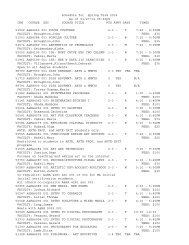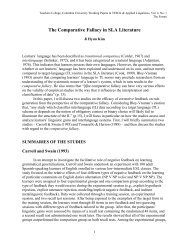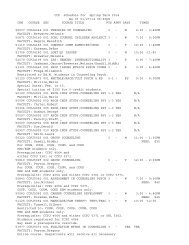UNICEF Mongolia - Teachers College Columbia University
UNICEF Mongolia - Teachers College Columbia University
UNICEF Mongolia - Teachers College Columbia University
Create successful ePaper yourself
Turn your PDF publications into a flip-book with our unique Google optimized e-Paper software.
CHAPTER 4: THE IMPLEMENTATION OF THE 2007 SALARY REFORM AT SCHOOL LEVEL<br />
1<br />
2<br />
3<br />
4<br />
5<br />
6<br />
TEACHERS IN MONGOLIA: AN EMPIRICAL STUDY ON RECRUITMENT INTO TEACHING,<br />
PROFESSIONAL DEVELOPMENT, AND RETENTION OF TEACHERS<br />
66<br />
educaon managers, and (in larger schools) by social workers to 436 teachers and 233 educaon<br />
managers in the PETS sample. Deducons from salary supplements, and to a lesser extent also from<br />
the base salary, were common pracce in 2005. The largest deducon made in the schools of the PETS<br />
sample was on average 6,975 MNT per month, which was at that me 6.7 percent of the mean monthly<br />
teachers’ income (average total pay of teachers was 103,647 MNT in 2005). The technical report of the<br />
PETS <strong>Mongolia</strong> study discusses the deducons in greater detail. 30<br />
The phenomenon of teacher absenteeism or prolonged absences is virtually nonexistent in <strong>Mongolia</strong><br />
because the salary is deducted from for the days missed in school. The PETS <strong>Mongolia</strong> study (World Bank<br />
2007, see Table 6) found that the proporon of teachers in rural schools who were absent on the survey<br />
day was much higher than those in urban schools; it was in fact three mes higher. It is important to<br />
bear in mind, however, that the school administrators may have misunderstood the term and equated<br />
teacher absenteeism with teacher vacancies—a fact that is also highlighted in the PETS <strong>Mongolia</strong> report.<br />
In any case, teacher absenteeism is not a common phenomenon, even though there used to exist vast<br />
differences with regard to regular aendance between teachers in rural and in urban schools.<br />
The reasons for deducons from the salary supplements or the base salary were quite diverse and<br />
difficult to assess objecvely. They included pedagogical issues (lesson planning and aenon to student<br />
development); disciplinary issues with students (class management); personal characteriscs of the<br />
teacher (personal organizaon and responsibility or morality, self-discipline and communicaon); and<br />
concerns that are parcularly important to the school administraon (organizaon of official documents<br />
and maintenance of school property). The most frequent reason for supplement reducon was when<br />
class teachers did not ensure that their students were on good behavior. Twenty-six percent of all<br />
“infracons”—leading to a supplement deducon—were related to “poor class management.” The<br />
PETS <strong>Mongolia</strong> showed clearly that both the addions (supplements, bonuses) and the deducons<br />
from the supplements lacked measurable and unambiguous evaluaon criteria. Therefore, most<br />
school administrators used to resort to purely subjecve evaluaon criteria, which were at mes more<br />
interpersonal than professional.<br />
Has the situaon changed six years later? From a legal perspecve, the situaon has indeed changed.<br />
The regulaon on supplements was revised and now states the entlement in terms of percentages of<br />
the base salary. The supplement for class teacher amounts to ten percent of the base salary, for cabinet<br />
leader five percent, and for head of the secon five percent. The earlier, vague formulaon of “up to<br />
ten percent” or “up to five percent” was replaced, thereby making deducons impossible from a legal<br />
perspecve. It is perhaps for this reason that none of the interviewed teachers in this study reported<br />
deducons from salary supplements. The social worker is in charge of monitoring the work of teachers<br />
as class teachers, and the educaon managers reviews the supplementary work of cabinet organizaon<br />
and head of the secon. As before, each school lists the tasks for class teacher, cabinet leader, and head<br />
of secon, but in contrast to a few years ago, the salary supplements are no longer deducted (in part<br />
or completely) if teachers are not performing well on these addional tasks. Today there is another<br />
mechanism in place to express discontent with the teacher’s work: the bonus system. <strong>Teachers</strong> who,<br />
according to the evaluaon carried out by educaon managers perform poorly either in their teaching<br />
or in their supplementary task(s), are supposed to receive a smaller bonus or no bonus at all. Both<br />
an outcomes-based contract and a quarterly performance bonus are supposed to control and sancon<br />
teachers. 31<br />
30 Gita Steiner-Khamsi and A. Gerelmaa (2006). The Public Expenditure Tracking Survey in <strong>Mongolia</strong>. Technical Report. New York<br />
and Ulaanbaatar: <strong>Teachers</strong> <strong>College</strong>, <strong>Columbia</strong> <strong>University</strong> & Open Society Forum, February 2006 (see chapter 5 on deducons).<br />
31 For quarterly performance bonus, see Resoluon of the Government of <strong>Mongolia</strong> #54, December 10, 2008.




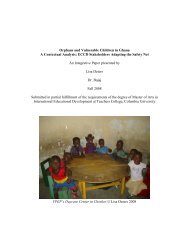
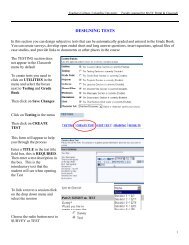
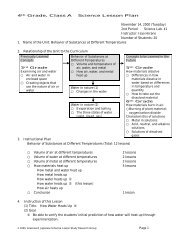

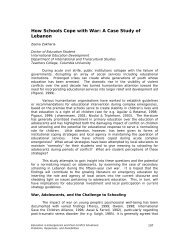




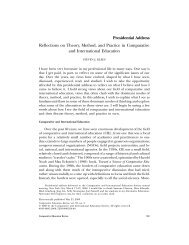
![TC Tod[...].pdf - Teachers College Columbia University](https://img.yumpu.com/27074883/1/190x252/tc-todpdf-teachers-college-columbia-university.jpg?quality=85)
